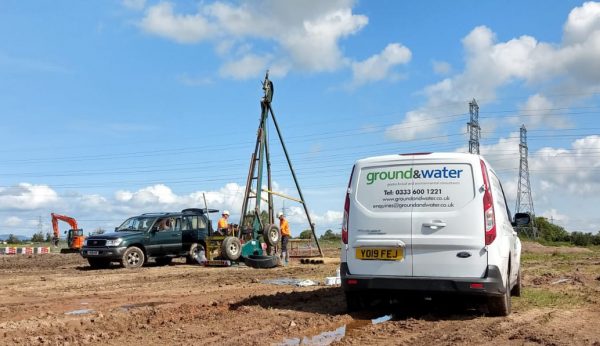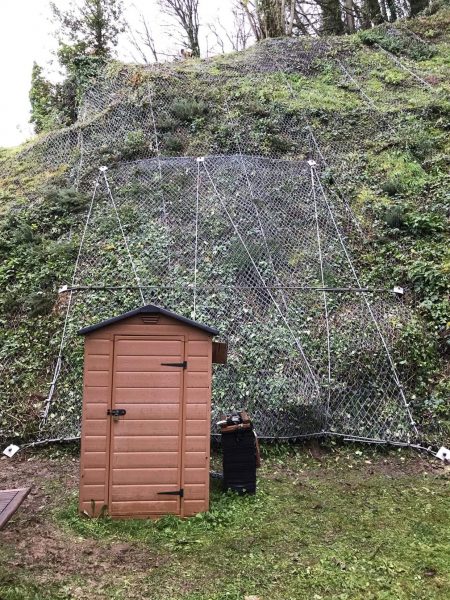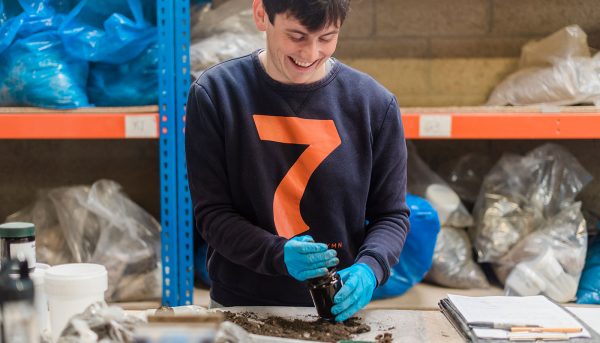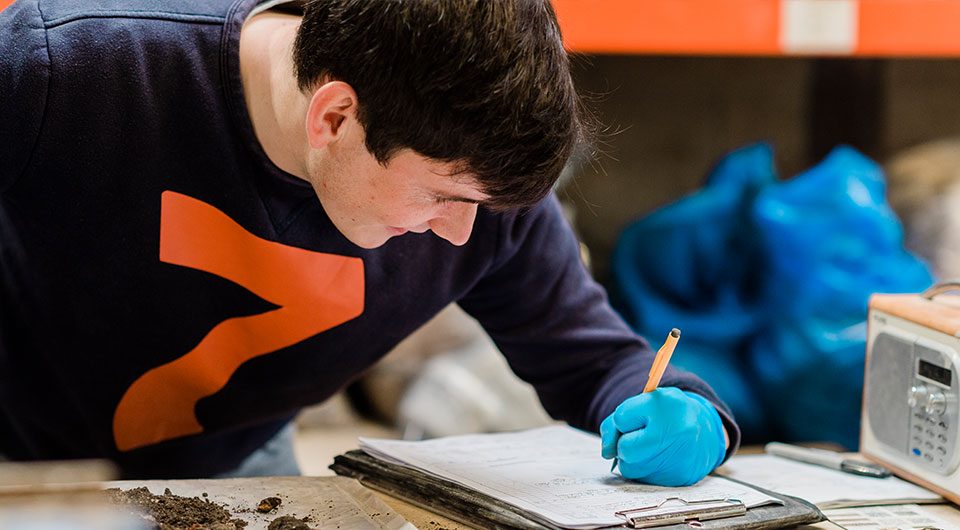Contracting or Consultancy? That is the question.
Geoenvironmental • Geotechnical • Human resources
After completing his Masters in Engineering Geology at Newcastle University, like the rest of his cohort, Ground & Water engineer Myles Finnerty, was released into the work place faced with his first career decision: Contracting or Consulting? In this blog post, Myles elaborates on his own experiences of moving from one world to the other, as a geotechnical and geoenvironmental engineer.
 Within geotechnical and geoenvironmental engineering – like much of the engineering world – other than the large internationals, companies are either contracting or consultancy service providers. Within the broader civil engineering field, consulting is one of the first elements of the project life cycle, involving liaising with clients to identify the requirements of the proposed project and specifying data required to inform and produce design solutions. Whereas contracting exists in the later stages of a project life cycle and involves boots on the ground carrying out investigation and construction works, to execute the consultant’s designs.
Within geotechnical and geoenvironmental engineering – like much of the engineering world – other than the large internationals, companies are either contracting or consultancy service providers. Within the broader civil engineering field, consulting is one of the first elements of the project life cycle, involving liaising with clients to identify the requirements of the proposed project and specifying data required to inform and produce design solutions. Whereas contracting exists in the later stages of a project life cycle and involves boots on the ground carrying out investigation and construction works, to execute the consultant’s designs.
I have been fortunate to work in both disciplines for two excellent companies. My first role, as a graduate engineer straight from my masters, was within the geotechnical department of a civil engineering contractor based in Guernsey. The second and current role, is as a geotechnical and geoenvironmental engineer with Ground & Water. What follows is an insight into my typical day within each role and the main learning opportunities they provided.
 My average day within contracting started at 07:30 with a meeting at the yard to set off the day’s operations, with the site workers going through the RAMS for the work ahead. After getting the team set, we mobilised to site with the required plant, equipment and materials. This often proved surprisingly difficult, given the combination of the narrow, maze like, Guernsey lanes, the size of plant and materials required and my dire knowledge of the Guernsey-French road names – something I thought I might get to grips with after seven years growing up there. Sadly, this was not the case. The typical works undertaken on any given day, would involve the construction of piling rafts for domestic properties, construction of steel reinforced ground beams and slabs, the installation of slope stabilisation schemes or ground investigation works. After liaising with clients and getting the site set up, I would then return to the office to catch up with quoting for future projects, carry out site visits in preparation for future works or catch up on the invoicing of recently completed jobs. There certainly wasn’t ever a dull moment and I really enjoyed the near 50/50 site/office split and fully managing my own time.
My average day within contracting started at 07:30 with a meeting at the yard to set off the day’s operations, with the site workers going through the RAMS for the work ahead. After getting the team set, we mobilised to site with the required plant, equipment and materials. This often proved surprisingly difficult, given the combination of the narrow, maze like, Guernsey lanes, the size of plant and materials required and my dire knowledge of the Guernsey-French road names – something I thought I might get to grips with after seven years growing up there. Sadly, this was not the case. The typical works undertaken on any given day, would involve the construction of piling rafts for domestic properties, construction of steel reinforced ground beams and slabs, the installation of slope stabilisation schemes or ground investigation works. After liaising with clients and getting the site set up, I would then return to the office to catch up with quoting for future projects, carry out site visits in preparation for future works or catch up on the invoicing of recently completed jobs. There certainly wasn’t ever a dull moment and I really enjoyed the near 50/50 site/office split and fully managing my own time.
With this being my first insight into the world of engineering, I was quickly surprised at just how much I would be using my phone to communicate with site workers, my boss, clients, engineers, suppliers, sub-contractors, logistics providers and the office. I quickly realised the vital role communication plays to ensure the smooth delivery of a project. I also had to quickly learn the processes involved with the management of people and projects, as this was not something I had any experience of. Going in and managing experienced site workers, was undoubtedly one of the greatest lessons I learnt in this role. I gained most by watching and listening to the way they went about working; observing both the correct and ‘alternative’ ways to carry out works and intervening as appropriate… Which became easier once I developed a rapport with the workers.
I thoroughly enjoyed my time working for a contractor, learning an awful lot about safe site working, time and people management and how decision making affected project finances. After 18 months and with the COVID-19 lockdown beginning to hit, I decided that I wanted to challenge myself more from a technical perspective and utilise more of my degree theory. I began looking for jobs with UK-based geotechnical consultancies, which three months later, took me to Ground & Water!
 Starting in my new role has been very different. With the first national lockdown in place, the on-boarding was all carried out remotely, which I am pleased to say was a very smooth process. I was quickly welcomed with a whole company Zoom call, which was great to start putting faces to names. My normal day within my new role, starts off with reviewing any client emails before checking in with the principal teams and my project tracker Excel spreadsheet, where I can see the upcoming deadlines for all of my projects. Here I can check site works dates, logging/scheduling and reporting deadlines. Should I need to log and schedule samples, I try and get it done in the morning, allowing plenty of time to get the samples ready for the couriers in the afternoon. Then it’s onto report writing or checking in with any site works being carried out. With only just over three months behind me, I have already been involved with a variety of projects involving the production of subsidence projects, phase 1 and phase 2 reports, nitrate neutrality reports for a site within Chichester and chalk dissolution risk assessments. I have also managed to get a few days out on site, including: overseeing a 40m cable percussion borehole being drilled to investigate dissolution features within chalk in Reading; carrying out soakaways in Winchester to aid in the design of domestic drainage and carrying out some trial pits in Fleet, to aid in the design of foundations. It has been a busy start with Ground & Water!
Starting in my new role has been very different. With the first national lockdown in place, the on-boarding was all carried out remotely, which I am pleased to say was a very smooth process. I was quickly welcomed with a whole company Zoom call, which was great to start putting faces to names. My normal day within my new role, starts off with reviewing any client emails before checking in with the principal teams and my project tracker Excel spreadsheet, where I can see the upcoming deadlines for all of my projects. Here I can check site works dates, logging/scheduling and reporting deadlines. Should I need to log and schedule samples, I try and get it done in the morning, allowing plenty of time to get the samples ready for the couriers in the afternoon. Then it’s onto report writing or checking in with any site works being carried out. With only just over three months behind me, I have already been involved with a variety of projects involving the production of subsidence projects, phase 1 and phase 2 reports, nitrate neutrality reports for a site within Chichester and chalk dissolution risk assessments. I have also managed to get a few days out on site, including: overseeing a 40m cable percussion borehole being drilled to investigate dissolution features within chalk in Reading; carrying out soakaways in Winchester to aid in the design of domestic drainage and carrying out some trial pits in Fleet, to aid in the design of foundations. It has been a busy start with Ground & Water!
I really appreciate the variety that a role within geotechnical and geoenvironmental engineering offers, along with the detail and technical aspects of consultancy. Whilst it has been a bit more challenging to get up to speed with my soil mechanics knowledge, I feel as though I am really getting into the swing of things. Where I previously felt as though I was simply organising the logistics, to ensure people and equipment got to the right place at the right time: Now I feel that I am personally adding value to the more technical elements of projects, which was one of the key elements, I felt was missing in my previous role. The transition from contracting to consultancy has provided me with exactly what I was looking for and I am looking forward to developing further in this role.
